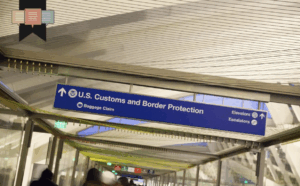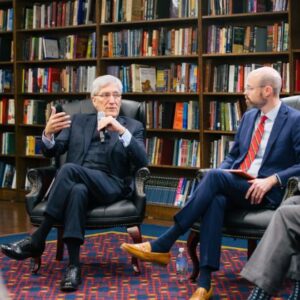Following his widely acclaimed Why Liberalism Failed from 2018, Notre Dame political philosopher Patrick Deneen’s follow-up, Regime Change: Toward a Postliberal Future (Sentinel 2023), builds off his prior work explaining what ails contemporary America and how to fix it. According to Deneen, a “peaceful but vigorous” overthrow of standard accounts of America’s political tradition is what it is in order. Deneen wants to retrieve an older account of political order that champions morality, tradition, and continuity instead of what he considers liberalism’s logic of moral libertinism and a stability-destroying commitment to “progress.”
The terminology in this argument is important: “Liberalism” is not the same as “progressivism.” Liberalism instead refers to classical liberalism, a school of political thought that organizes society primarily around the concern for individual rights, the rule of law, and limited government. It’s what we are accustomed to as Americans. According to Deneen, it is this liberalism—and not merely some contaminated form of it—that is the root cause of our problems. America’s problems, according to Deneen, exist because liberalism has proved successful.
Liberalism, according to Deneen, is by nature a regime of disintegration. What human beings need most—stability, order, and continuity—is torn asunder by design in liberal regimes. Liberalism renders impossible a broad social vision oriented around the common good. Because liberalism tends toward the maximization of individual expression ripped from any concern for religion, and because liberalism sees “progress” as the unalloyed reason for its existence, both Left-Liberals and Right-Liberals are at fault in America’s long march toward self-desiccation.
Left-Liberals see progress in the form of moral revolution and individual liberation from repressive traditions. Right-Liberals measure progress in economic improvement with little concern for capitalism’s rapacious disruption of place, tradition, and family. Liberalism creates both economic and moral upheaval. For Deneen, examples of terminal liberalism are evident in modern universities and corporations. Both embody a moral and economic revolution guided by the forces of woke totalitarianism. The resulting markets and moral ecosystems are unaccountable to the unwashed masses of flyover country.
What is needed to offset these acids is a return to an earlier regime, Deneen argues. He wants a “mixed constitutional order” that solves the problem of relating the “few” to the “many,” one of the perennial quandaries of political philosophy that dates to Aristotle. Deneen calls for the return of a “noble elite,” an “aristopopulism” where the elites serve the interests of the masses through strengthening the “central goods of family, community, good work, an equitable social safety net supportive of these goods, constraints upon corporate power, a culture that preserves and encourages order and continuity, and support for religious belief and institutions.” To summarize Deneen’s goal in writing: “While superficially the same political order, the replacement of rule by a progressive elite by a regime ordered to the common good through a ‘mixed constitution’ will constitute a genuine regime change.”
Deneen proposes some fascinating policies to renew and reintegrate America according to his post-liberal mold: Among the many ways to relate the “few” and the “many” together is a higher apportionment of members of Congress so that smaller populated areas have higher representation in government; another would be, following Ross Douthat’s original proposal, to decentralize the federal government and move its various departments to different geographic locations in America; he also calls for mandatory national service (ostensibly like Israel) and policies designed to uplift the natural family. Critics of post-liberalism cannot accuse the movement of not offering concrete proposals. The book contains more than I can list.
Evangelical Christians will doubtlessly sympathize with many of Deneen’s critiques about the excess and moral debauchery of late modern liberalism. When transgender activists are glamorized and Christians are cast as bullies, Deneen’s thesis resonates. But whether we’ve strayed from a more wholesome vision or whether George Washington and Thomas Jefferson meant for us to have drag queens is what is up for debate. At root, Deneen’s vision accords with an “early modern” conservative outlook associated with the likes of Thomas Aquinas, Edmund Burke, and Alexis de Tocqueville.
So what is not to love about Regime Change? Deneen’s moral imagination raises fewer concerns than his needless combativeness toward other conservatives, unstated optimism about corralling a population as large as America under his vision, and the severe dismissiveness and selective definition of liberalism.
A question for Patrick Deneen is thus: Is someone who is a “conservative” in the Burkean sense of the term that defends the American ideals outlined in the Declaration and Constitution a post-liberal? After reading Regime Change, I cannot tell where I would place myself in his taxonomy of political categories. Deneen may consider me a post-liberal, but I do not consider myself one. I am a conservative Christian who applauds America’s original constitutional order and does not wish to “redo” what 1776 gave us, even if it was imperfect. Even as a staunch social conservative, I don’t think the answer is Roman Catholic integralism (a major subcurrent of Deneen’s larger academic project). Liberalism does have dilemmas at its core that it cannot perfectly resolve (for example, look up the Böckenförde Dilemma). But Deneen’s overly simplistic binary makes it appear as though the philosophical progenitors of liberalism were malevolent ventriloquists intentionally trying to rig the system.
But here’s the irony: If “early modern” conservatism is what Deneen is calling for, why is his vision post-liberal? Is conservatism opposed to all aspects of modernity as Deneen sees it? Are not elements of liberalism itself conservative, owing to the tradition’s resonance with many of Christianity’s anthropological tenets? Is not a stress on the value of the human being a liberal value and not only a conservative one? By whose authority is liberalism reducible to living according to one’s impulses and nerve endings? Nothing about Deneen’s volume requires any sort of drastic alteration to our constitutional regime apart from the body politic forging a better moral imagination. If that is the case, the adjective “post-liberal” is synonymous with conservatism or is superfluous and should be abandoned.
In fairness, Deneen is not calling for an overthrow of America’s constitutional regime but a rethinking of the same Constitution’s pathos and telos. In other words, we do not need a new Constitution, we need a new moral vision of what constitutions are for. Deneen believes this requires repudiating liberalism as the dominant regime because of the necessary conclusions that result from its mistaken origins, namely autonomy and untrammeled “progress.” But I was not convinced that his understanding of liberalism is the only liberalism on offer.
For example, the perfectionist liberalism of philosophers like Christopher Wolfe or Robert P. George can accommodate the realities of reconciling the “few,” the “many,” and the “good” without laying waste to liberalism tout court. I do not consider myself a “Right-Liberal” in the way that Deneen may consider me as one. There is a way to argue for the “few” and the “many” within a classically liberal constitutional order while also arguing for a robust conception of the good necessary to just order. One could argue that the separation of powers and the mixed composition of their chambers already exhibit a “mixed” Constitution. What if Deneen’s protest is really against the messiness of 335 million persons attempting to live together? It’s worth asking whether Deneen’s problem runs deeper than just liberalism, a problem rooted in human fallenness.
The strongest section of Regime Change is its practical advice for reforming society into a more “mixed” political community. Here is where Christians should pay careful attention to how to apply Deneen’s call for rebuilding institutions that inculcate morality, build community across diverse lines, and thus reinforce custom and continuity. We should in particular consider the importance of churches in shaping moral vision alongside active participation in the civic arena.
One can buy into a lot of Deneen’s thesis and still not feel the need to reject all aspects of the liberal inheritance. Indeed, American ideals operationalize the very thing that previous pre-liberal regimes have been unable to accomplish in the long run: an ability for self-reform and continuity within its own system. Here is where a major critique of post-liberalism comes into view: Its bent toward nostalgia (for a past that never was as ideal as it was depicted) trades on the problematic assumption that societies are small, static, and homogeneous. But societies change, and while Deneen is correct to call for gradualism in how society changes, he owes us an explanation for why flavors of pre-liberalism, what he paints as the ideal, were rejected. Perhaps wars of religion, the arbitrary absolutes of the rule of man instead of the rule of law, and the economic caste system of feudalism proved undesirable. Maybe hard forms of nationalism proved less desirable than negotiating moral conflict when large groups of people live together.
Everything is a trade-off, after all. Liberalism does not necessarily entail the celebration of liberty for liberty’s sake. Liberalism is the acknowledgment that negotiating conflict in society is always an imperfect art. To be clear, society should be ordered to the common good, and we should elect virtuous leaders to lead in such a direction. The question that looms for a book like Regime Change is the feasibility of enacting a common vision under a constitutional arrangement that serves hundreds of millions of people. Deneen’s book seems less plausible on the national level and more appropriately calibrated for thinking about America as a collection of smaller communities, each able to obtain and sustain their own moral vision. Claiming a single American hegemony has proven increasingly impossible. Whether this is the result of liberalism or sheer population growth is a topic that would require more space than I have here.
Deneen’s volume is sure to shape much of the ongoing conversation around what ails America, as his previous volume did. But as an ethics professor, let me conclude with where I think Deneen is onto something. His characterization of America’s problems begins with moral presuppositions.
Under John Stuart Mill’s harm principle, the law prohibits only those actions that harm others. That can be helpful, but applied to society more broadly, this approach to moral philosophy results in a society where every action is permissible, including immoral action, insofar as it doesn’t harm others—at least not obviously. But that’s the problem with Mill’s approach: What constitutes a true harm? Post-liberals are correct to conclude that Mill’s principle supplants an older code of objective moral absolutes. We can debate to what extent Millian utilitarianism was at the heart of liberalism, but it is no doubt the toxin coursing through its present-day veins.




